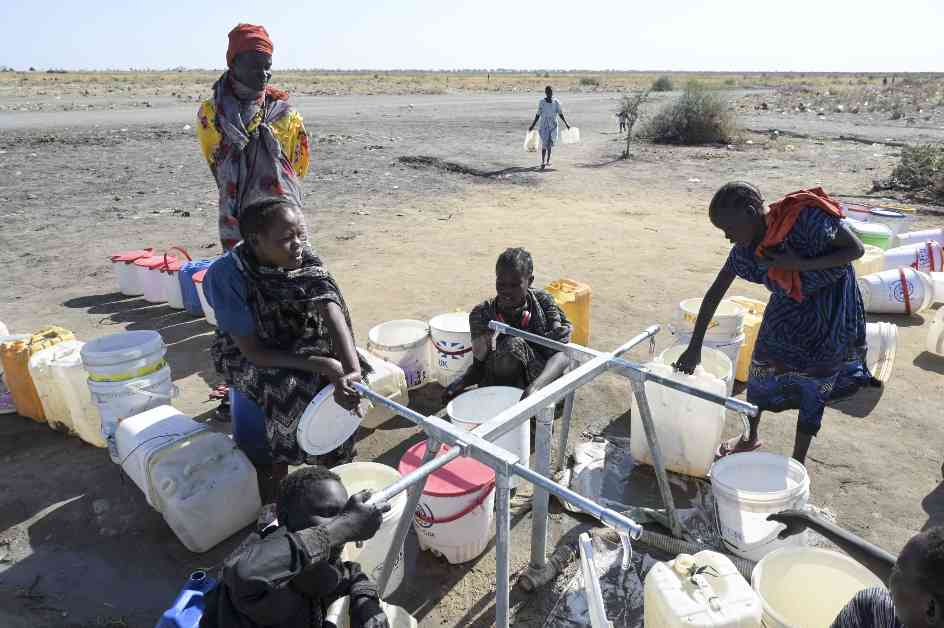In the conflict-ridden nation of South Sudan, women and girls are facing increasing health risks and deepening inequalities as a result of the detrimental effects of climate change amid record-breaking heat. The World Weather Attribution (WWA) group of scientists shed light on these findings ahead of International Women’s Day on March 8, revealing that February’s scorching heatwave was amplified tenfold and two degrees Celsius hotter due to human-induced climate change.
As the heatwave swept through the nation, dozens of students in the capital city of Juba succumbed to heatstroke, prompting the closure of schools for weeks. This marked the second time in consecutive years that the country had to shut down schools during the period between February and March due to extreme temperatures. Typically, such high temperatures are not anticipated until later in the year, making this year’s early heatwave all the more unusual, according to the research.
Most schools in South Sudan are constructed with iron roofs that trap heat, lacking air conditioning systems, thereby creating unbearable conditions for students, especially amidst the prolonged heatwaves. These soaring temperatures are predicted to linger throughout March, posing severe challenges for the populace.
Challenges Faced by Women and Girls
In the face of these extreme weather events, women and girls bear the brunt of the impact, with school closures disrupting education and hindering young girls’ return to learning. Moreover, women’s roles in jobs and household chores often expose them to dangerous temperatures, increasing their susceptibility to heat-related illnesses, as highlighted in the analysis.
Kiswendsida Guigma, a climate scientist at the Red Cross Red Crescent Climate Centre in Burkina Faso, emphasized that improving ventilation, planting trees, and painting schools in lighter colors can help mitigate temperatures in classrooms and maintain educational continuity. Adjusting school calendars and class schedules may also prevent severe disruptions to education, he added.
Gender Disparities Amplified by Climate Vulnerability
Friederike Otto, lead of the WWA and a senior lecturer in climate science at Imperial College London, underscored that persistent gender roles, coupled with the need to care for children and limited alternatives to escape intense heat, exacerbate the vulnerability of women in South Sudan. The burning of fossil fuels has exacerbated extreme weather events, disproportionately impacting those already grappling with inequitable conditions, Otto noted.
Globally, women are more likely to experience fatalities during extreme weather events, along with food shortages and post-disaster violence, emphasizing the urgent need to address inequalities and reduce greenhouse gas emissions from fossil fuels, she stressed.
The research conducted by a team of 17 experts from various universities and meteorological agencies across several countries revealed that the heightened heatwaves in South Sudan this year would have been significantly less likely without the approximately 1.3 degrees Celsius of global warming since pre-industrial times. This escalating heat also heightens the risk of miscarriages and stillbirths, intensifying the dangers of pregnancy and childbirth in a nation plagued by one of the highest maternal mortality rates globally.
Emmanuel Raju, a researcher from the University of Copenhagen and one of the study’s authors, highlighted the disproportionate impact of climate change on women and girls worldwide, attributing it to existing social disparities that place an undue burden on women, perpetuating hardships and responsibilities.
Intense heatwaves with temperatures exceeding 40 degrees Celsius are no longer sporadic occurrences in South Sudan due to climate change. With a current 1.3-degree Celsius global warming, similar extreme heatwaves in February are projected to transpire approximately once per decade. However, should nations fail to swiftly transition away from fossil fuels, such extreme heat events are anticipated to become an annual ordeal by the year 2100, escalating to dangerous levels.
Sarah Kew, a researcher from the Royal Netherlands Meteorological Institute, highlighted the alarming trend of increasingly frequent 40-degree-plus heatwaves becoming the new normal in South Sudan. She warned that without a rapid shift towards a fossil fuel-free world, these perilous heatwaves will only intensify, posing significant challenges for the nation’s populace and particularly its women.














